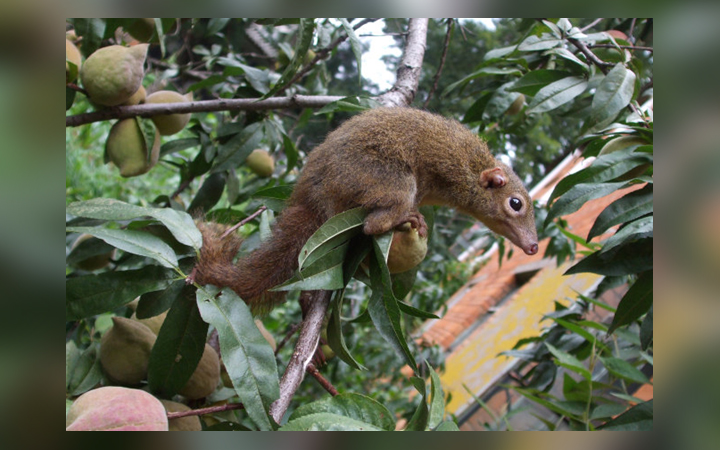Hot Take: Tree Shrews Love Chili Peppers

Get the world’s most fascinating discoveries delivered straight to your inbox.
You are now subscribed
Your newsletter sign-up was successful
Want to add more newsletters?

Delivered Daily
Daily Newsletter
Sign up for the latest discoveries, groundbreaking research and fascinating breakthroughs that impact you and the wider world direct to your inbox.

Once a week
Life's Little Mysteries
Feed your curiosity with an exclusive mystery every week, solved with science and delivered direct to your inbox before it's seen anywhere else.

Once a week
How It Works
Sign up to our free science & technology newsletter for your weekly fix of fascinating articles, quick quizzes, amazing images, and more

Delivered daily
Space.com Newsletter
Breaking space news, the latest updates on rocket launches, skywatching events and more!

Once a month
Watch This Space
Sign up to our monthly entertainment newsletter to keep up with all our coverage of the latest sci-fi and space movies, tv shows, games and books.

Once a week
Night Sky This Week
Discover this week's must-see night sky events, moon phases, and stunning astrophotos. Sign up for our skywatching newsletter and explore the universe with us!
Join the club
Get full access to premium articles, exclusive features and a growing list of member rewards.
Many people in cultures around the world enjoy mouth-searingly spicy food and deliberately seek it out — a preference that was once thought to be shared by no other mammal. But scientists have discovered a primate relative that doesn't reject fiery flavors — in fact, it eats them quite eagerly.
Researchers recently captured a video that shows a Chinese tree shrew (Tupaia belangeri chinensis), a rat-size animal native to southern Asia, busily nibbling on a spicy pepper and showing no signs of feeling the heat. [Image Gallery: Evolution's Most Extreme Mammals]
The burning feeling that accompanies eating, or even tasting, hot peppers can be exceptionally painful. In one extreme case, after a man ate a burger topped with pureed ghost peppers — among the hottest chili peppers in the world — he retched so violently from the pain that he suffered a torn esophagus and a collapsed lung. Another hot pepper, named Dragon's Breath, which was recently developed by botanists in the U.K., is said to be so hot that eating it could lead to fatal anaphylactic shock, Live Science previously reported.
The chili peppers that the tree shrews munched on were positively mild by comparison, but they do produce a sharp, burning sensation that deters most birds and mammals. However, when scientists in China offered the shrews chili peppers, they were surprised to find that the shrews ate them enthusiastically — whether alone or mixed with other food — and with no ill effects, they wrote in the study.
Mice, on the other hand, avoided foods that had been mixed with chili peppers, the researchers noted.
The peppers don't grow in the shrews' natural habitat, and thereby aren't part of their normal diet. So what gives? Genetic analysis revealed that Chinese tree shrews possess a single mutation linked to reduced sensitivity to capsaicinoids — a group of compounds that includes capsaicin, which lends peppers their heat. This likely evolved in the shrews as an adaptation in response to a spicy plant in their native habitat called Piper boehmeriaefolium, which produces a chemical similar to capsaicin, according to the study.
For people who aren't put off by too much heat, the ability to enjoy spicy flavors enables them to sample a wider variety of dishes representing a range of cultures. Similarly, tree shrews that developed a taste for pungent plants found more meal options within their habitats — a useful adaptation for survival — compared with animals that shunned the spicy plants, the study authors reported.
Get the world’s most fascinating discoveries delivered straight to your inbox.
The findings were published online July 12 in the journal PLOS Biology.
Original article on Live Science.

Mindy Weisberger is a science journalist and author of "Rise of the Zombie Bugs: The Surprising Science of Parasitic Mind-Control" (Hopkins Press). She formerly edited for Scholastic and was a channel editor and senior writer for Live Science. She has reported on general science, covering climate change, paleontology, biology and space. Mindy studied film at Columbia University; prior to LS, she produced, wrote and directed media for the American Museum of Natural History in NYC. Her videos about dinosaurs, astrophysics, biodiversity and evolution appear in museums and science centers worldwide, earning awards such as the CINE Golden Eagle and the Communicator Award of Excellence. Her writing has also appeared in Scientific American, The Washington Post, How It Works Magazine and CNN.
 Live Science Plus
Live Science Plus











